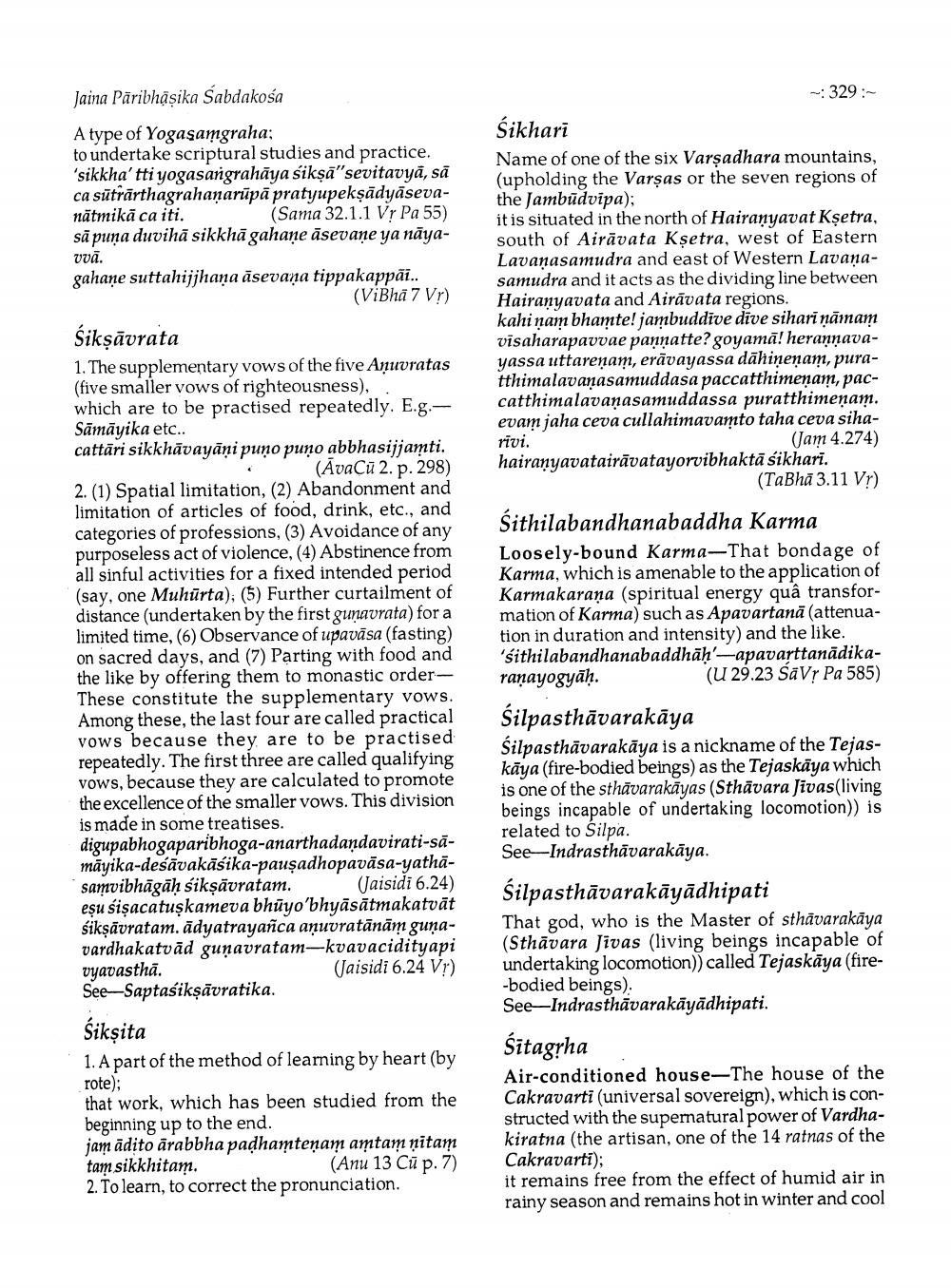________________
-329:
śikhari Name of one of the six Varşadhara mountains, (upholding the Varşas or the seven regions of the Jambūdvipa); it is situated in the north of Hairanyavat Kșetra, south of Airāvata Kşetra, west of Eastern Lavanasamudra and east of Western Lavanasamudra and it acts as the dividing line between Hairanyavata and Airāvata regions. kahi nam bhamte! jambuddive dīve sihari ņāmam visaharapavvae pannatte? goyamā! herannavayassa uttareņam, erāvayassa dāhiņeņam, puratthimalavaṇasamuddasa paccatthimenam, paccatthimalavanasamuddassa puratthimenam. evam jaha ceva cullahimavamto taha ceva siharīvi.
(Jam 4.274) hairanyavatairāvatayorvibhaktā śikhari.
(TaBhā 3.11 Vr)
Jaina Pāribhậșika Sabdakośa A type of Yogasamgraha; to undertake scriptural studies and practice. 'sikkha' tti yogasangrahāya sikşā"sevitavyā, sā ca sütřārthagrahanarūpā pratyupekşādyāsevanātmikā ca iti.
(Sama 32.1.1 Vr Pa 55) sā puna duvihā sikkhā gahane āsevane ya nāyavvā. gahane suttahijjhana āsevaņa tippakappăi..
(ViBha 7 Vr) Śikṣāvrata 1. The supplementary vows of the five Aņuvratas (five smaller vows of righteousness), which are to be practised repeatedly. E.g.Sāmāyika etc.. cattāri sikkhāvayāņi puno puno abbhasijjamti.
(AvaCū 2. p. 298) 2. (1) Spatial limitation, (2) Abandonment and limitation of articles of food, drink, etc., and categories of professions, (3) Avoidance of any purposeless act of violence, (4) Abstinence from all sinful activities for a fixed intended period (say, one Muhurta); (5) Further curtailment of distance (undertaken by the first gunavrata) for a limited time, (6) Observance of upavāsa (fasting) on sacred days, and (7) Parting with food and the like by offering them to monastic orderThese constitute the supplementary vows. Among these, the last four are called practical vows because they are to be practised repeatedly. The first three are called qualifying vows, because they are calculated to promote the excellence of the smaller vows. This division is made in some treatises. digupabhogaparibhoga-anarthadandavirati-samāyika-desăvakāśika-pausadhopavāsa-yathasamvibhāgāḥ śikṣāvratam. (Jaisidi 6.24) esu śişacatuṣkameva bhūyo'bhyāsātmakatvät śikṣāvratam. ādyatrayañca anuvratānām gunavardhakatvād guņavratam-kvavacidityapi vyavasthā.
(Jaisidi 6.24 Vr) See-Saptasikşāvratika.
Sithilabandhanabaddha Karma Loosely-bound Karma—That bondage of Karma, which is amenable to the application of Karmakarana (spiritual energy quâ transformation of Karma) such as Apavartanā (attenuation in duration and intensity) and the like. 'sithilabandhanabaddhāḥ-apavarttanädikaraņayogyāḥ.
(u 29.23 SaVr Pa 585)
Śilpasthāvarakāya Śilpasthāvarakāya is a nickname of the Tejaskāya (fire-bodied beings) as the Tejaskāya which is one of the sthāvarakāyas (Sthāvara Jivas(living beings incapable of undertaking locomotion)) is related to Silpa. See-Indrasthāvarakāya. Śilpasthāvarakāyādhipati That god, who is the Master of sthävarakāya (Sthāvara Jivas (living beings incapable of undertaking locomotion)) called Tejaskāya (fire-bodied beings). See-Indrasthāvarakāyādhipati. Śītagrha Air-conditioned house-The house of the Cakravarti (universal sovereign), which is constructed with the supernatural power of Vardhakiratna (the artisan, one of the 14 ratnas of the Cakravarti); it remains free from the effect of humid air in rainy season and remains hot in winter and cool
Śikṣita 1. A part of the method of learning by heart (by rote): that work, which has been studied from the beginning up to the end. jam ādito ārabbha padhamteņam amtam nitam tam sikkhitam.
(Anu 13 Cū p.7) 2. To learn, to correct the pronunciation.




